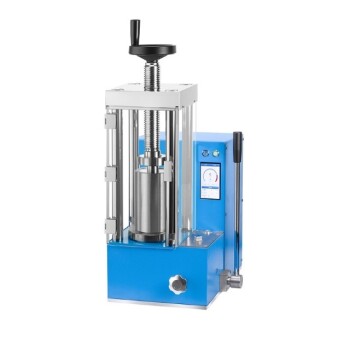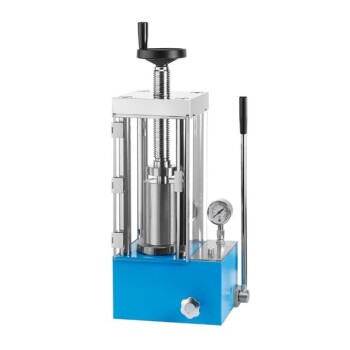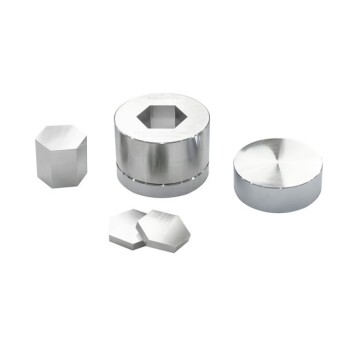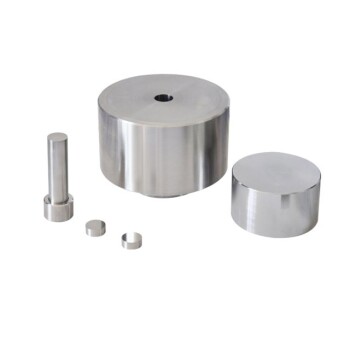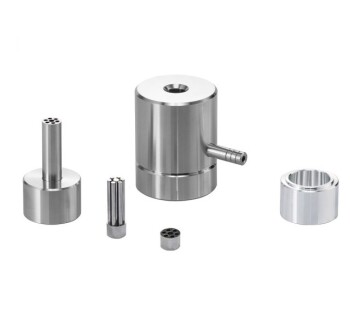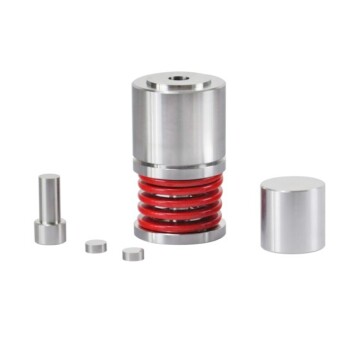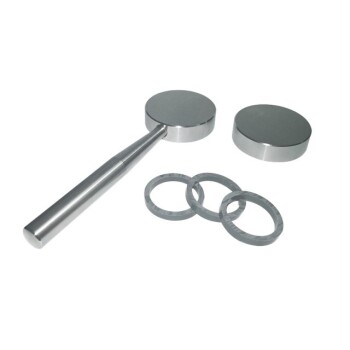In short, Cold Isostatic Pressing (CIP) is a foundational technology for industries where material failure is not an option. Key sectors include aerospace and defense, medical implants, advanced electronics, and energy. CIP is used to uniformly compact powdered materials into a solid "green" part before a final heat treatment, ensuring exceptional density and strength in the finished component.
The core value of Cold Isostatic Pressing is not merely its ability to form parts, but its ability to impart uniform density by applying equal pressure from all directions. This single principle is why it is indispensable for manufacturing high-performance components where internal voids or weaknesses would lead to catastrophic failure.
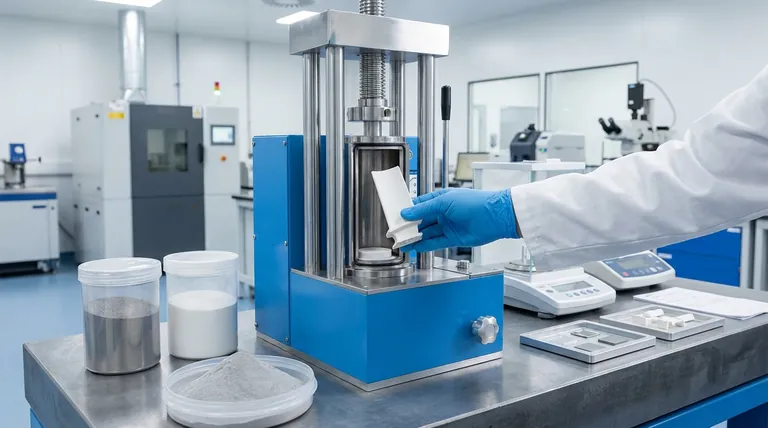
The Core Principle: Why Uniform Pressure Matters
Cold Isostatic Pressing solves a fundamental problem in powder metallurgy that traditional methods cannot. It is used to create a solid mass from a powder before it undergoes a final strengthening process like sintering.
How CIP Achieves Uniformity
The process is elegantly simple. A powdered material, such as a ceramic or metal alloy, is sealed in a flexible, mold-like container. This container is then submerged in a fluid within a high-pressure vessel. The fluid is pressurized, exerting equal force on every surface of the mold simultaneously.
The Weakness of Traditional Pressing
Contrast this with traditional uniaxial (single-direction) pressing. When you press a powder from only the top and bottom, friction against the die walls prevents pressure from being transmitted evenly throughout the part. This results in density gradients, creating weak points that can become failure points under stress.
The Result: A Superior "Green" Part
Because CIP applies pressure isostatically (equally from all directions), it virtually eliminates these density gradients. The result is a uniformly compacted "green" part—a fragile, chalk-like object that is perfectly homogenous. This uniformity is critical, as it ensures the component will be strong and predictable after its final sintering or heat treatment.
Key Industry Applications Breakdown
The need for uniform material integrity drives the adoption of CIP across several high-stakes industries.
Aerospace, Defense, and Space
For these sectors, component reliability is a matter of mission success and safety. CIP is used to form complex, mission-critical parts from advanced materials like superalloys, composites, and technical ceramics.
- Examples: Turbine blades, rocket engine components, structural brackets, armor plating.
- Benefit: Maximizing the strength-to-weight ratio and ensuring components can withstand extreme temperatures and pressures without failing.
Medical and Pharmaceutical
In the medical field, material performance directly impacts patient health. CIP is essential for creating durable, biocompatible implants and for producing consistent pharmaceutical tablets.
- Examples: Ceramic dental implants and hip joint heads, surgical instruments, and compacted drug powders for uniform dissolution.
- Benefit: Creates non-porous implants that resist wear and degradation within the body. Ensures every tablet has a consistent density for reliable dosing.
Electronics and Energy
Specialized electronic and nuclear components depend on perfectly uniform material properties to function correctly.
- Examples: Ferrite magnets, sputtering targets for semiconductor manufacturing, ceramic insulators, and nuclear fuel pellets.
- Benefit: Uniform density ensures predictable magnetic, electrical, and nuclear properties, which is critical for performance and safety.
Industrial and Automotive
For applications involving high wear and extreme conditions, durability is paramount. CIP is used to form components from extremely hard materials like cemented carbides.
- Examples: Metal forming tools, cutting tips, bearings, and high-performance valve seats.
- Benefit: The homogenous density achieved through CIP leads to exceptional hardness and wear resistance, extending the life of the tool or component.
Understanding the Trade-offs of CIP
While powerful, CIP is a specific tool for a specific job. It is not a universal solution and has important limitations to consider.
It's a Preliminary Step, Not a Final One
A common misconception is that CIP produces a finished part. The output of CIP is a "green" part that is fragile and has no significant structural strength. It must undergo a subsequent high-temperature process, such as sintering or Hot Isostatic Pressing (HIP), to fuse the particles and achieve its final density and strength.
Slower Cycle Times and Higher Costs
Compared to high-speed uniaxial pressing, CIP is typically a batch process. Loading and unloading the pressure vessel takes time, making it less suitable for very high-volume, low-cost commodity parts. The equipment itself also represents a significant capital investment.
Limitations on Final Shape and Tolerance
The flexible tooling used in CIP does not provide the rigid dimensional control of a steel die. While excellent for complex shapes, the final dimensions are primarily determined by the predictable shrinkage that occurs during the subsequent sintering stage, which must be carefully managed.
Is CIP the Right Choice for Your Application?
Choosing the right powder compaction method depends entirely on the requirements of your final component.
- If your primary focus is maximum density and material integrity in a complex part: CIP is the ideal, and often necessary, first step before sintering.
- If your primary focus is producing a fully dense, finished part in a single step: You should investigate Hot Isostatic Pressing (HIP), which combines pressure and heat simultaneously.
- If your primary focus is high-volume manufacturing of simple shapes where minor density variations are acceptable: Traditional uniaxial die pressing is likely the more cost-effective choice.
Ultimately, understanding where and why to apply uniform pressure is the key to mastering high-performance material manufacturing.
Summary Table:
| Industry | Key Applications | Primary Benefits |
|---|---|---|
| Aerospace, Defense, and Space | Turbine blades, rocket components, armor plating | Maximizes strength-to-weight ratio, withstands extreme conditions |
| Medical and Pharmaceutical | Dental implants, surgical instruments, drug tablets | Ensures biocompatibility, uniform dissolution, and reliable dosing |
| Electronics and Energy | Ferrite magnets, sputtering targets, nuclear fuel pellets | Provides predictable magnetic, electrical, and nuclear properties |
| Industrial and Automotive | Cutting tools, bearings, valve seats | Enhances hardness, wear resistance, and component lifespan |
Ready to enhance your lab's capabilities with reliable Cold Isostatic Pressing solutions? KINTEK specializes in lab press machines, including automatic lab presses, isostatic presses, and heated lab presses, designed to meet the demanding needs of laboratories in aerospace, medical, electronics, and more. Our equipment ensures uniform density and superior material integrity for your high-performance components. Contact us today to discuss how we can support your specific applications and boost your efficiency!
Visual Guide
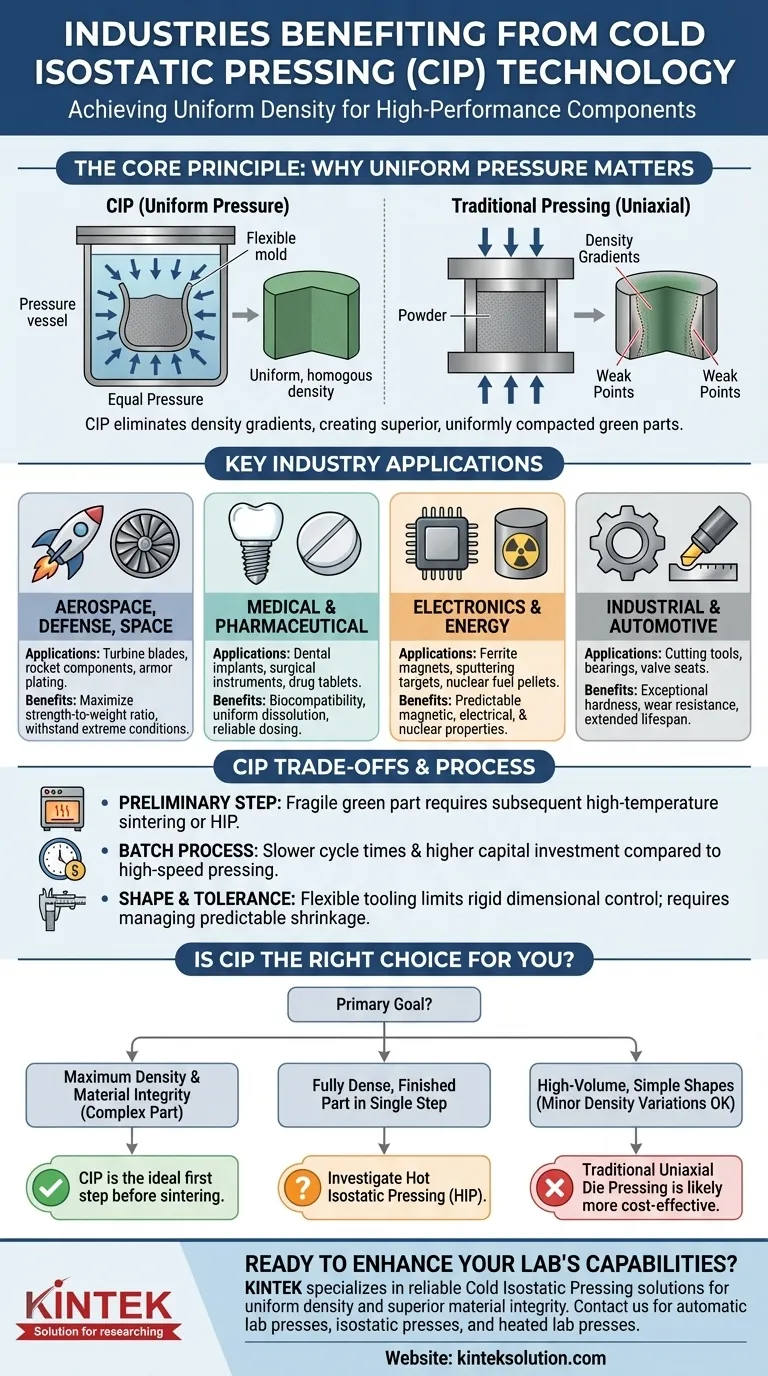
Related Products
- Electric Lab Cold Isostatic Press CIP Machine
- Electric Split Lab Cold Isostatic Pressing CIP Machine
- Automatic Lab Cold Isostatic Pressing CIP Machine
- Manual Cold Isostatic Pressing CIP Machine Pellet Press
- Lab Polygon Press Mold
People Also Ask
- What are the advantages of uniform density and structural integrity in CIP? Achieve Superior Performance and Reliability
- What are the two main techniques used in cold isostatic pressing? Wet-Bag vs. Dry-Bag Methods Explained
- What industries benefit from Cold Isostatic Pressing technology? Ensure Reliability in Aerospace, Medical, and More
- Why is a Cold Isostatic Press (CIP) required for the formation of Nb-Ti alloy green compacts? Ensure Density Uniformity
- What are the characteristics of the isostatic pressing process? Achieve Uniform Density for Complex Parts
